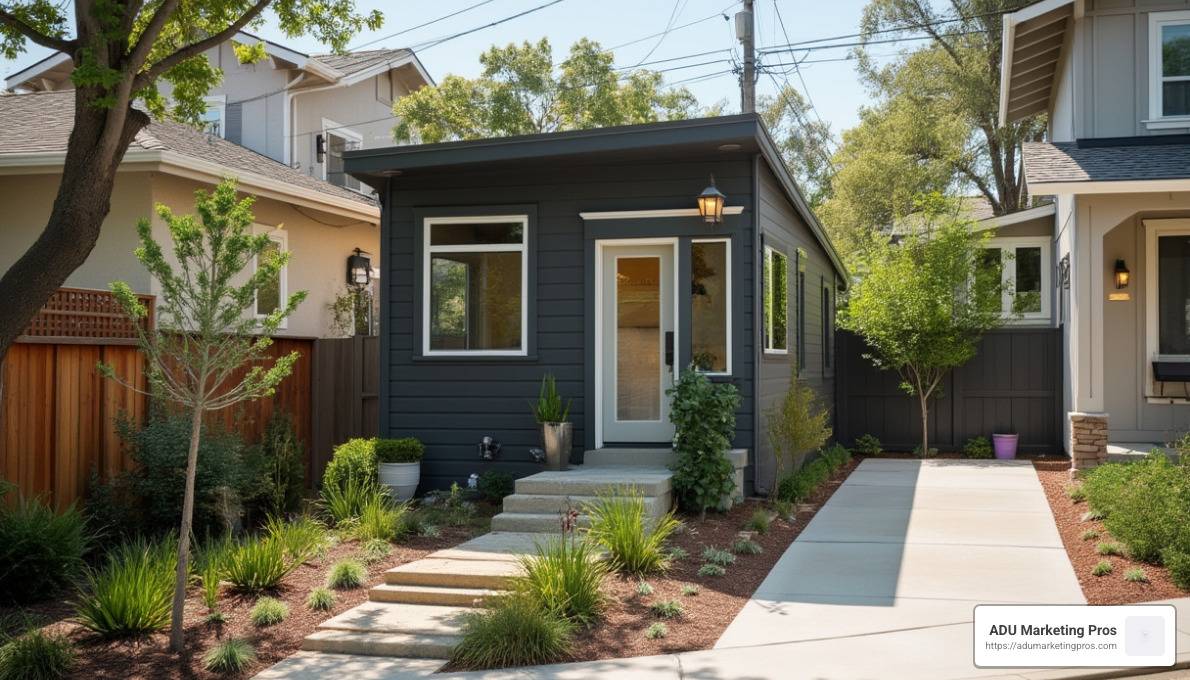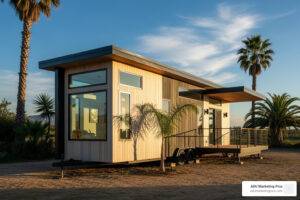ADU rental income taxes are a crucial consideration for anyone looking to open up the rental potential of an accessory dwelling unit (ADU). Whether you’re new to the concept or a seasoned veteran in the ADU landscape, understanding how taxes apply to rental income can be complex. Here are some quick facts:
- ADUs, also known as in-law suites or granny flats, are secondary residential units on the same lot as a primary home.
- Renting out an ADU can provide a significant boost in income. However, it also comes with tax responsibilities.
- Rental income from ADUs is taxable, and you must report it to the IRS.
- Numerous deductions exist, such as expenses for maintenance, mortgage interest, and property management.
ADUs have become increasingly popular, especially in urban areas like Los Angeles, California, where housing demand is climbing. Homeowners are capitalizing on this trend by changing spaces into rental units for extra income. However, the prospect of higher taxes can be daunting.
When considering building and renting an ADU, keep in mind the potential for increased property taxes and the need for proper tax reporting. Navigating these aspects cleverly could mean the difference between a profitable venture and an unexpected financial burden.
By gaining a solid understanding of how taxes will impact your rental income from an ADU, you can make informed decisions and maximize your investment.

Understanding ADU Rental Income Taxes
How is ADU Rental Income Taxed?
When you rent out an ADU, the rental income you earn is taxable. This means you’ll need to report it to the IRS. The way you report this income depends on whether your rental is short-term or long-term.
-
Short-Term Rentals: If your ADU is rented out for short periods, like on Airbnb, this income is reported on Schedule C of your tax return. This is similar to how a business would report its earnings.
-
Long-Term Rentals: For longer leases, you’ll report the income on Schedule E. This is used for passive income, where you’re not actively managing the property daily.

Tax Deductions for ADU Owners
Owning an ADU can offer significant tax deductions, which help reduce your taxable income. Here are some deductions you might qualify for:
-
Depreciation: Over time, the value of your ADU can be depreciated. This means you can deduct a portion of the ADU’s construction cost each year. It’s a way to account for wear and tear.
-
Maintenance Costs: Regular maintenance, like repairs or landscaping, is deductible. If you’re keeping the property in good condition for tenants, those costs can be subtracted from your taxable income.
-
Mortgage Interest: If you have a mortgage on your property, you can deduct the interest related to the portion of your home that is the ADU. This can be a significant deduction, especially in high-interest areas like Los Angeles.
These deductions can significantly lower the amount of tax you owe on your rental income. However, it’s crucial to keep detailed records and consult IRS guidelines to ensure you’re eligible.
By understanding these tax implications, you can make the most of your ADU investment. Properly managing these taxes not only helps in compliance but maximizes your financial benefits.
Next, we’ll explore the property tax implications of building an ADU and how it can affect your overall tax situation.
Property Tax Implications of Building an ADU
How ADUs Affect Property Taxes in California
Building an Accessory Dwelling Unit (ADU) in California can increase your property taxes, but it’s not as drastic as you might think. Thanks to Proposition 13, the primary residence is not reassessed when you add an ADU. Instead, only the new structure is evaluated. This is called a blended assessment.
Blended Assessment Explained
When you build an ADU, the county assessor calculates the value of the new construction separately. This new value is then added to the existing property assessment. The tax increase applies only to the ADU, not the entire property. For example, if you build a 500-square-foot ADU, only that portion is reassessed, not your main home.
Construction Cost Basis
The assessed value of your ADU is typically based on the construction costs or the market value at the time of completion. In places like San Diego County, assessors often use “wholesale” construction costs, which might be lower than what you actually spent. This can mean a smaller tax increase than expected. For instance, if your ADU costs $150,000 to build, and the county uses a $130-$165 per square foot rate, you might see a lower assessed value.
Proposition 13 and Reassessment Rules
Proposition 13 limits the annual increase in property tax to 2% based on the original purchase price, unless there’s new construction or a change in ownership. The construction of an ADU falls under “new construction,” triggering a reassessment only for the ADU itself. This keeps your main home’s tax base intact.
If you’re in Los Angeles or other parts of California, these rules ensure that your property tax increase is manageable, focusing only on the new addition rather than your entire property. This approach makes adding an ADU a more feasible option for many homeowners.

Understanding these property tax implications helps you plan better financially. Next, we’ll dive into maximizing tax benefits with ADUs, including potential credits and deductions.
Maximizing Tax Benefits with ADUs
Using an ADU as a Home Office
Turning your ADU into a home office can open up valuable tax benefits. The home office deduction allows you to write off a portion of expenses like utilities, insurance, and maintenance. To qualify, the space must be used regularly and exclusively for business purposes.
Business Expenses You Can Deduct:
- Utilities: A portion of your electricity, water, and gas bills.
- Insurance: Part of your homeowner’s insurance that covers the ADU.
- Maintenance and Repairs: Costs for maintaining the ADU that are related to your business use.
The IRS has guidelines to help you determine what qualifies as a deductible expense. It’s crucial to keep detailed records and consult a tax professional to ensure compliance.
Leveraging Short-Term Rentals for Tax Benefits
Renting your ADU on platforms like Airbnb can also be tax-efficient. Airbnb income is taxable, but you can offset it with deductions for expenses related to the rental.
Key Tax Benefits for Short-Term Rentals:
- Section 280A: This section of the tax code allows you to deduct expenses if you rent out your ADU for more than 14 days a year.
- Cleaning Fees: Costs related to cleaning your ADU after guests can be deducted.
- Supplies and Amenities: Items like toiletries or guest amenities are deductible.
Different rules apply based on how long you rent out your ADU. Short-term rentals have different tax implications than long-term leases, so understanding these distinctions can maximize your tax benefits.
Energy-Efficient Upgrades
Incorporating energy-efficient upgrades into your ADU can further improve your tax benefits. While California doesn’t offer specific ADU tax credits, you may qualify for federal or state incentives if your ADU includes features like solar panels or energy-efficient appliances.
By strategically using your ADU as a home office or a short-term rental, you can significantly reduce your tax liability. Next, we’ll answer some frequently asked questions about ADU rental income taxes to clarify any remaining doubts.
Frequently Asked Questions about ADU Rental Income Taxes
Is ADU rental income taxable?
Yes, ADU rental income is taxable. Whether you’re renting out your ADU for short-term stays on platforms like Airbnb or for long-term leases, the income you earn must be reported to the IRS. You will need to include this income on your tax return using forms like Schedule E and Form 1040. That while this income is taxable, you can also claim deductions that can help reduce your overall tax liability.
Can I deduct ADU construction costs?
Yes, you can potentially deduct some of the costs associated with constructing your ADU, but it depends on how you use the unit. If your ADU is primarily used as a rental property, you may be able to deduct costs such as depreciation, maintenance, and mortgage interest. However, if your ADU is used for personal reasons, like housing a family member, the deductions may be more limited. It’s always a good idea to consult a tax professional to understand what specific deductions you qualify for.
Does an ADU increase my property taxes?
Adding an ADU to your property can impact your property taxes. In many cases, building an ADU will lead to a reassessment of your property’s value, which could increase your property taxes. In California, the increase is often calculated using a blended assessment method, which combines the original property value with the new construction cost. However, under Proposition 13, the tax increase is capped, limiting how much your property taxes can rise annually. It’s important to check with local authorities to understand how ADUs affect property taxes in your area.
Conclusion
Navigating ADU rental income taxes can be complex, but it’s crucial for maximizing the financial benefits of your investment. At ADU Marketing Pros, we understand that tax planning is a key component of making your accessory dwelling unit a profitable venture.
Why Tax Planning Matters
Effective tax planning can significantly impact your bottom line. By understanding the tax implications of your ADU, you can make informed decisions that optimize your financial outcomes. Whether it’s through claiming deductions for mortgage interest, maintenance, or depreciation, the right strategy can lead to substantial savings.
ADU Marketing Pros: Your Partner in Success
We specialize in marketing strategies custom for ADU construction and architecture firms, helping you attract high-quality leads and grow your revenue. Our expertise in the ADU sector allows us to provide insights that not only improve your marketing efforts but also support your financial planning.
Explore our services to see how we can help you stand out in a competitive market.
Open uping Financial Benefits
ADUs offer a dual advantage: they can increase your property’s value while providing rental income. With proper tax planning, these benefits can be maximized, turning your ADU into a gateway for long-term financial prosperity. By leveraging tax deductions and credits, you can reduce your tax liability and keep more of your rental income.
In conclusion, understanding and managing your ADU rental income taxes is essential for maximizing the financial rewards of your investment. ADU Marketing Pros is here to guide you every step of the way, ensuring your ADU not only meets your housing needs but also improves your financial well-being.




